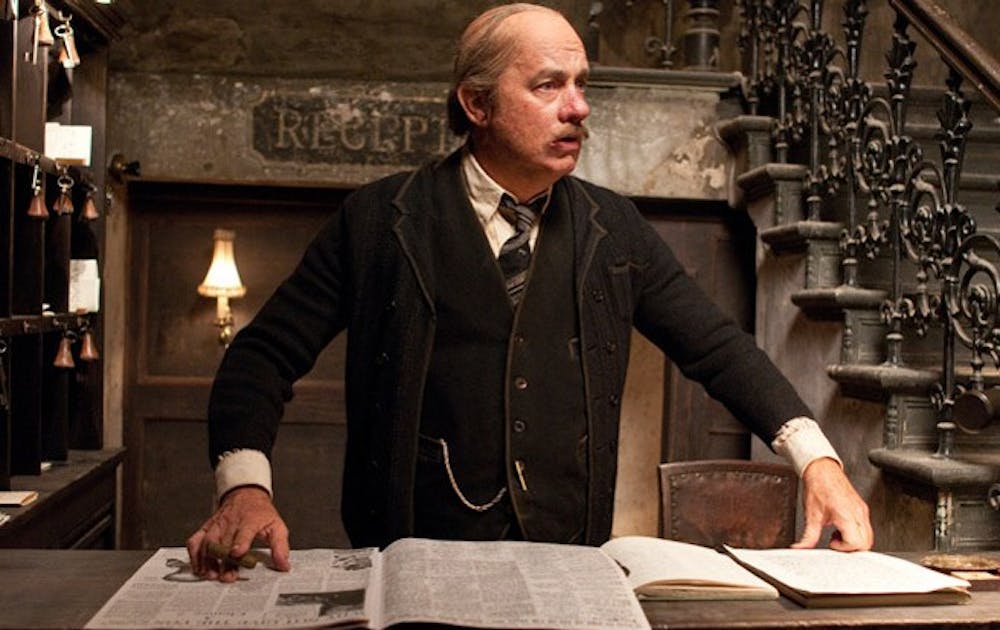This past summer, I saw a trailer for Cloud Atlas. Some of you might remember its five-minute runtime and absurdly over-the-top presentation of a complex premise (“Fear. Belief. Love. Death. Life. Birth. Future. Present. Past. Love. Hope. Courage. Everything is Connected.”). Few casts are more prestigious—Tom Hanks, Halle Berry and Hugh Grant to name a few actors, with the Wachowskis (The Matrix trilogy) and Tom Tykwer (Run Lola Run) writing and directing—so I was appropriately excited for the film. So excited, in fact, that I ran down to the Kindle store and bought myself a copy of the book. Unfortunately, Cloud Atlas suffers the fate of nearly every book-to-movie adaptation, especially those that attempt to condense a long and thematically dense novel into one feature film. Unlike a handful of stories that come to mind (the Lord of the Rings trilogy, The Orchid Thief/Adaptation), the book is always better than the movie.
The conversion from book to film does a few things to a story: dictates what everything looks like, fixes the pace and inevitably cuts out portions of the plot. The Wachowskis and Tykwer did even more, abandoning novelist David Mitchell’s elegantly unfolding “Russian-doll” plot structure for a simultaneous mish-mash of all six plots. Despite having read the book, the constant change of time and place is a lot to keep track of, especially while following the grand-scale progress of each actor’s ‘meta-character’ (each main actor plays characters in multiple eras in an attempt to connect the different stories—more on that later). The directorial trio traded the original structure for frenetic, almost schizophrenic, swaps between epochs and locales. While they may have gained a certain momentum (I was bored only once or twice in 172 minutes), they lost the nuanced connectivity found in the original novel.
By presenting in the novel the first half of each story in turn, Mitchell allows readers to weave their own thematic threads across the ages, resolving and enriching these connections as each story concludes in reverse chronological order. The directors decided to dictate these trajectories to the audience through casting. Tom Hanks has a role in all six storylines; these characters are meant to be linked into a ‘meta-character.’ Taking such grand liberties creates confusion and dissonance when the filmmakers’ suppositions do not match the reader’s. Also problematic are the constant switches between which meta-characters take the lead; Hanks and Berry head two storylines, Jim Sturgess and Doona Bae take two more and Jim Broadbent and Ben Whishaw each have their own main role. The revolving door of protagonists ruins much of the intertwined structure that is central to the novel’s success.
The repetitive use of the same core ensemble, while potentially powerful, is taken to the point of absurdity. Berry, for example, is easily spotted in four of the storylines (five if you really pay attention). But wait! That wrinkly, cackling, Asian plastic surgeon of the future we see for fifteen seconds? A truly unrecognizable Halle Berry. All of the actors have these gimmicky, impossible-to-spot roles, revealed to many “oohs” and “aahs” during the credits reel. I can think of no legitimate explanation as to why the filmmakers decided to shroud their stars in masks and makeup for such tiny roles as “Korean musician” or “Prescient #3.”
The use of makeup in Cloud Atlas has garnered some controversy, especially within the Asian-American actor community. The filmmakers were reportedly race-blind in their casting, and a story set in Korea dictated that most of the actors wear “yellowface” (the term is misleading—Keith David’s dark complexion was left unchanged). Doona Bae made the reverse change, donning a fake nose, colored contacts and faux freckles to make herself appear Caucasian (and in another instance a vindictive Hispanic pet owner). None of the race-changing makeup is convincing. Hugo Weaving (oh, yeah, he’s in it too) is still Hugo Weaving, albeit a slightly creepy, Na’vi-esque version of himself. The liberal use of gender-bending is similarly unnecessary. While a few of the meta-character arcs necessitate it (namely Weaving’s), other instances of gender-swapping accomplish nothing but a few cheap laughs. In all, it seems unnecessary to mask the potential of such a brilliant cast with layers of rubber and pigment.
As I mentioned above, Cloud Atlas follows in the footsteps of nearly every other book-to-film adaptation. While it is hard to extract the film from its associations with the novel, I imagine I would have really liked it had I not read the book. It’s easy to discern the Wachowskis’ influence in the construction of New Seoul, with obvious parallels to The Matrix trilogy, namely the oppressive, dark cityscape and the constantly deadpan acting. And, like in The Matrix, it works. The Wachowskis know how to craft great sci-fi settings; their New Seoul is far richer and more expansive than my own imagined version. Furthermore, the writers/directors allowed a bit of lightness into their three-hour brainbuster, adding a nice dash of humor now and then, and I, for one, was thankful for the laughs. While Hanks’s Irish accent could use a little work and the post-futuristic speech patterns are too much for Berry, portraying profoundly different characters is undeniably impressive.
Mitchell has said many times that he originally saw Cloud Atlas as unfilmable. I’m inclined to agree. Sure, the Wachowski/Tykwer team made a valiant effort and created something of worth, but when considered alongside the novel, the adaptation of Cloud Atlas is a lukewarm substitute.
Get The Chronicle straight to your inbox
Signup for our weekly newsletter. Cancel at any time.

